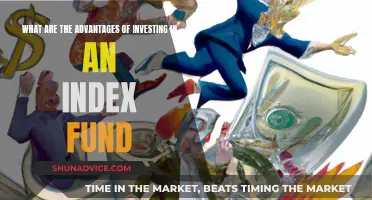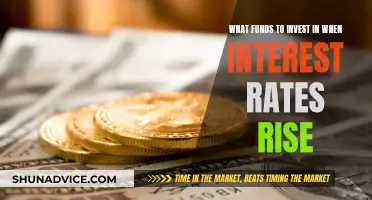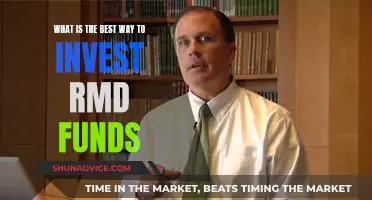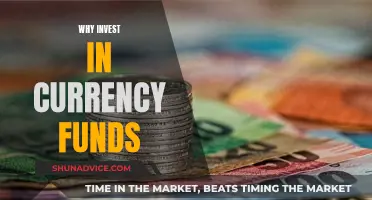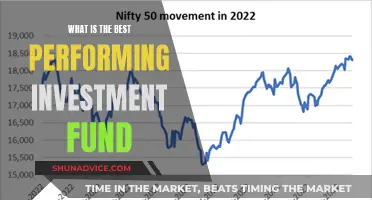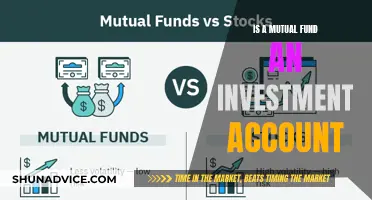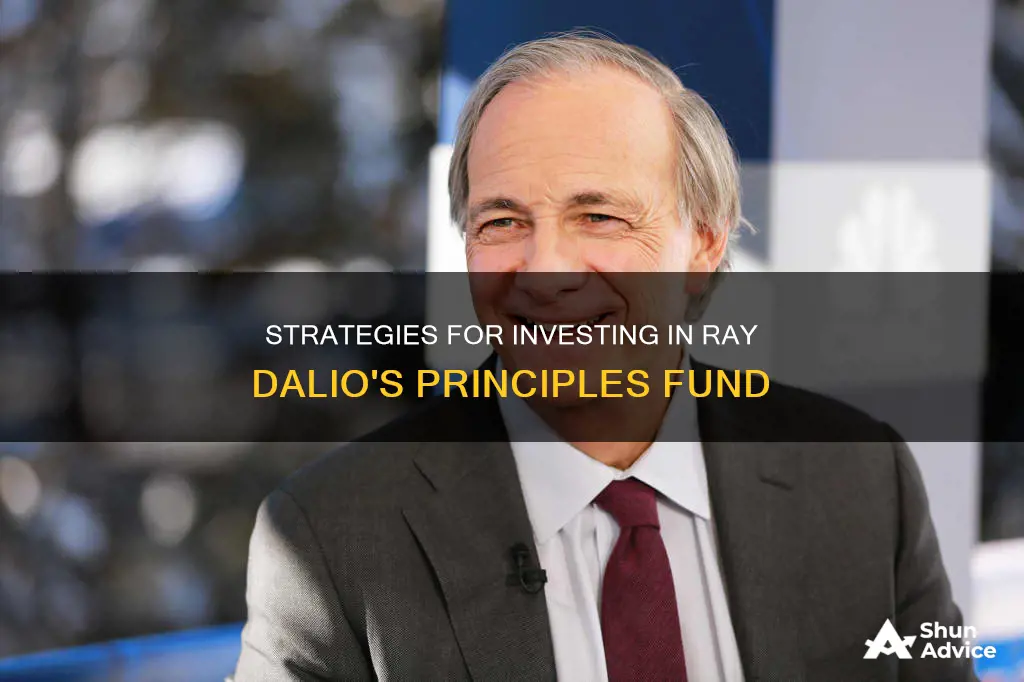
Ray Dalio is an American entrepreneur and hedge fund manager with a net worth of $15.4 billion, according to Forbes. He founded Bridgewater Associates, the world's largest hedge fund, in 1975 and is known for his successful investment strategies. Dalio stepped down as co-chief investment officer of Bridgewater in 2022 but remains a board member and mentor. With Bridgewater managing about $150 billion in assets as of 2022, here's an overview of how to invest in Ray Dalio's fund and the key considerations for potential investors.
| Characteristics | Values |
|---|---|
| Founder | Ray Dalio |
| Company | Bridgewater Associates |
| Year founded | 1975 |
| Company type | Hedge fund |
| Total portfolio value | $20.1 billion |
| Top holdings | iShares Core S&P 500 ETF, iShares Core MSCI Emerging Markets ETF, Alphabet Inc., Procter & Gamble Co., Meta Platforms Inc. |
| Investment strategy | Diversification across asset types, sectors, and currencies; investing in uncorrelated assets; taking profits on fully priced stocks |
| Notable investments | Gold, cryptocurrencies, iShares Core S&P 500 ETF, iShares Core MSCI Emerging Markets ETF, Alphabet Inc., Procter & Gamble Co., Meta Platforms Inc., Johnson & Johnson, Costco Wholesale Corp., Coca-Cola |
What You'll Learn

Ray Dalio's investment strategy
Ray Dalio is a billionaire investor and founder of the world's largest hedge fund, Bridgewater Associates. Dalio's investment strategy is underpinned by a set of principles he has developed over the years, which he has shared in speeches, memos, and a 600-page book called 'Principles'.
Dalio's investment approach is based on five key themes:
- The economy drives investment opportunities and risks: Dalio is a macro investor who studies economic trends to find opportunities and identify risks. He predicts long-term cycles in the market and adjusts his portfolio accordingly.
- Inflation poses serious threats to investors: Dalio advocates holding gold as an alternative source of money to protect against inflation. His signature allocation for managing wealth during troubled economic times is the All Weather portfolio, which includes a 7.5% allocation of gold.
- Investors can manage risk by combining uncorrelated assets: Dalio recommends diversifying across 15 or more uncorrelated assets to reduce the risk-to-return ratio. He suggests that investors should take profits on fully priced stocks and reinvest in undervalued stocks.
- Bias is a major contributor to investor losses: Dalio suggests that investors should periodically analyse their investment decisions and identify their directional beliefs to avoid holding positions for too long and missing out on profits.
- The state of the economy dictates which investments to avoid: Dalio has changed his stance on cash, now viewing it as more attractive than stocks and bonds. He remains bearish on bonds due to huge debt balances and negative real yields.
In addition to these themes, Dalio also emphasises the importance of understanding cause-and-effect relationships in the market. For example, when investing in commodities, he forecasts demand by looking at factors such as how many cattle are being fed and how much grain they consume.
Dalio's most famous investment strategy is the All-Weather Portfolio, which he designed to perform well in all economic environments. The portfolio consists of 40% long-term US government bonds, 30% US stocks, 15% intermediate-term US government bonds, 7.5% gold, and 7.5% other commodities. This portfolio aims to have equal contributions to overall portfolio risk from each asset class, with less exposure to stocks and more exposure to bonds due to their higher volatility.
Dalio's investment strategies have resulted in remarkable success. Since the inception of Bridgewater Associates, the firm has made over $50 billion in net investment profits.
Invest Wisely: Franklin India Prima Plus Fund Guide
You may want to see also

Dalio's macro perspective
Ray Dalio is a billionaire investor known for his macro investing strategies. Dalio's macro perspective is centred on economic trends and cycles, diversification, and risk management.
Dalio's approach to diversification is further reflected in his "Holy Grail of Investing" strategy, which involves balancing bets across different asset classes. By combining uncorrelated assets, he aims to reduce risk without sacrificing returns. Additionally, Dalio suggests leveraging bonds to match equity on a return-per-risk basis.
Overall, Dalio's macro perspective focuses on economic analysis, diversification across uncorrelated assets, and leveraging to balance risk and return.
Explore Mutual Funds for Your Defence Sector Investment
You may want to see also

Inflation and its threats
Ray Dalio, the billionaire founder of Bridgewater Associates, has long been interested in inflation and its effects. He first became interested in macroeconomic trends and currency exchange rates as a young man when President Nixon ended the Bretton Woods monetary system. Dalio has a healthy respect for inflation's ability to damage purchasing power and investment returns. He has been a longtime advocate of holding gold as an alternative source of money.
Dalio has warned that reducing inflation will come at a great cost. He believes that the Fed's tightening of interest rates will not "make things good again" but will instead shift the burden from inflation to a reduction in people's buying power. He also believes that government deficits and Fed actions are hurting private credit.
Dalio and other experts are bracing for painful inflation, recessions, and market turmoil around the world. They fear stubborn inflation, surging unemployment, shrinking economies, and tumbling asset prices. They blame years of debt-fuelled buying and borrowing, pandemic disruptions, and the Russia-Ukraine conflict.
The US inflation rate hit a 40-year high of 9.1% in June 2022, prompting the Federal Reserve to hike interest rates to a range of 3.0% to 3.25%. This has caused the US dollar to reach a 20-year high, putting pressure on other central banks to follow suit. This, in turn, has caused debt crises in vulnerable developing countries with large amounts of dollar-denominated debt.
The outlook for Europe is also bleak, with an expected energy crisis, recession, and the impact of the Russia-Ukraine war. Dalio has also warned about China's debt crisis, particularly in its heavily leveraged real estate sector, and the supply disruptions caused by the country's lockdowns.
Best Mutual Funds: Where to Invest Smartly
You may want to see also

Managing risk through diversification
Diversification is a key component of Ray Dalio's investment strategy. Dalio, the founder of the world's largest hedge fund, Bridgewater Associates, is a big proponent of diversification. He recommends investors diversify across 15 or more uncorrelated assets to reduce the risk-to-return ratio.
Uncorrelated assets do not move together, either directly or inversely. For example, gold and the S&P 500 have a low correlation; the S&P 500 can crash without affecting gold spot prices. By diversifying across asset types, sectors, and currencies, investors can reduce their exposure to risk and protect their investments.
Dalio's focus on global diversification is evident in his investment portfolio. He holds stakes in various exchange-traded funds (ETFs), such as the iShares Core S&P 500 ETF and the iShares Core MSCI Emerging Markets ETF, which provide exposure to large-cap U.S. stocks and emerging market equities, respectively.
In addition to ETFs, Dalio also invests in individual stocks across a diverse range of industries. For example, he holds stakes in technology companies like Alphabet Inc. and Meta Platforms Inc., consumer goods companies like Procter & Gamble Co. and Costco Wholesale Corp., and healthcare companies like Johnson & Johnson.
Dalio's diversification strategy also extends to alternative assets. He has stated that he owns cryptocurrencies as part of his investment portfolio. Additionally, he has a well-known allocation strategy called the ""All Weather" portfolio, which includes a 7.5% allocation of gold. This portfolio is designed to manage wealth during troubled economic times.
By diversifying across a wide range of assets, Dalio aims to reduce risk and protect his investments from market downturns. His strategy has contributed to his success as one of the world's most respected investors.
Investing in Index Funds: A Minor's Guide
You may want to see also

Taking profits on fully priced stocks
Ray Dalio is a billionaire investor and founder of Bridgewater Associates, the world's largest hedge fund. Dalio is no longer the chairman and co-chief investment officer of Bridgewater Associates, but investors still closely follow the fund's holdings.
Dalio is not a pure buy-and-hold investor. He believes in taking profits on expensive stocks and then reinvesting. He calls this practice "rotating the portfolio". Appropriate targets for reinvestment are undervalued stocks—good companies that are lagging the economy or their sector.
Bridgewater's 2023 portfolio changes demonstrate this rotation in action. In the first quarter, Bridgewater sold out of Bank of America and Wells Fargo but increased its position in the Chinese fintech firm Lufax Holdings. This move signals a belief that opportunities in large U.S. banks may be winding down. Smaller, growing economies may be the better choice in the months ahead.
Dalio's macro perspective earned Bridgewater special acclaim in the 2000s. As a longtime student of the economy, Dalio saw signs of trouble before the 2008 financial crisis. He adjusted the Bridgewater portfolios to prepare for a recession, and the move paid off. In 2008, Bridgewater's Pure Alpha fund grew, while the average hedge fund lost 19%.
Dalio's current view on the US economy is that the hurdle for US companies to replicate the exceptional financial market returns of the last decade is very high. The US market is 70% of the MSCI World, and to keep that up, 70% of the money going into equity markets has to go into US equities.
In contrast, Dalio and Bridgewater's view on China is that it is extremely depressed in terms of what's being expected. The market is pricing in negative earnings growth into the future, which presents an interesting difference to the US.
Index Funds: Free Investing and Smart Money Moves
You may want to see also


